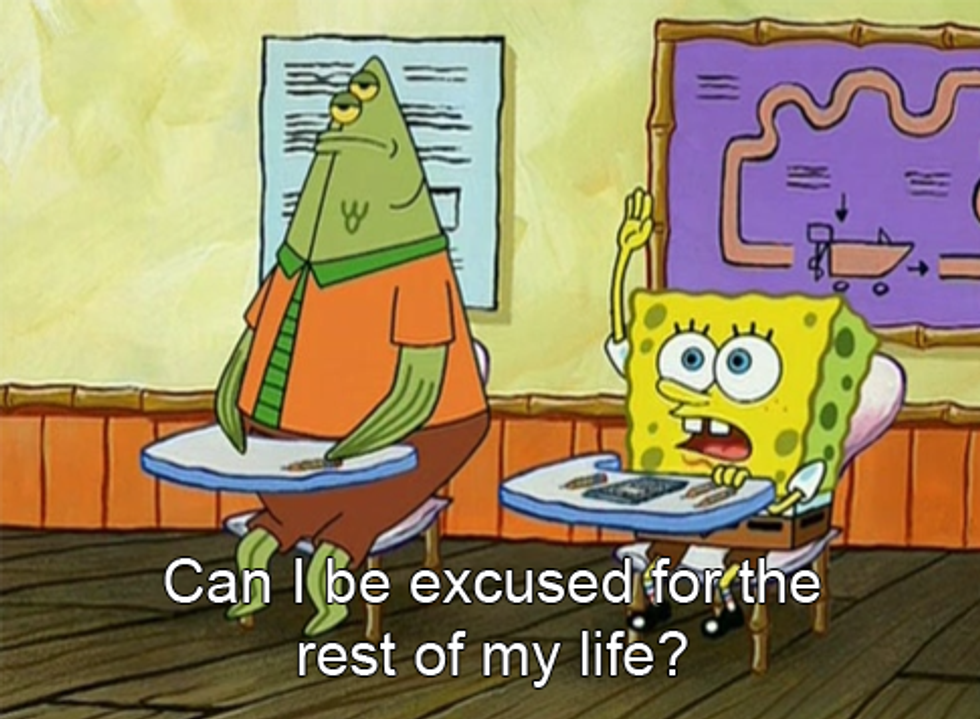A common misconception in college is that if you're studying what you like, you will never fail. Logically, you have no reason to fail -- you're motivated, you enjoy it, and it's "fun." You go to every class, every office hour, sign up to tutor in that subject, basically it's your "thang."
People start coming to you for advice and help on homework, and soon enough you consider yourself a subject matter expert (SME). We've all been there- cruisin' on our inflated egos, sharing inside jokes with our professors, whispering about that one kid who questionably made it this far- but then the unexpected happens. You fail your very first exam and your beloved subject suddenly isn't so beloved. Question is, what're you gonna do? Here's my game plan for when college throws you some curve balls:
Step 0: BREATHE. Call your dog. If you don't have a dog, GET one. Drop out of college ASAP before your parents find out. Then charge your dad's credit card and buy a plane ticket far far away and don't tell anyone. Pack one carry-on and put your dog in it. Get on the plane. Land in a different country. Walk your dog around that country to meet new people. Make friend's with those people and get hired making espresso. Then, venmo dad back for the ticket (but in a discrete way so he can't track you). Years later, call your professor and ask them for a letter of recommendation and a copy of the exam you failed so you can learn from your mistakes.
... for the record, I'm kidding about all that but two things. Do breathe, and do learn from your mistakes, which leads me to step 1...
Step 1. Reach out to your profs, go to office hours, and talk about the exam.
Bring a small notebook and write down the questions you got wrong and the correct answers. Ask for a copy if that's allowed. Talk about the wrong answers and why you got them wrong and why you thought you got them right. Did you second guess yourself or did you really not know? This is an important step because once you analyze your test and your thought process, you can easily find patterns in the way you take exams and in the way that you think. Then you can find what those "gaps" are and fix them. For me, one of my gaps was forgetting the difference between expected dividends and just paid dividends -- a very common mistake that is very easy to fix. It's also a mistake I now rarely make.
Step 2. Ask yourself if you're actively studying.
Find the right place for you. I personally like the atrium in Straz and the Brew Bayou on campus. Off campus, I enjoy any coffee shop that isn't too small and has sturdy tables. I know that I need noise and I need people around me otherwise my mind wanders and three hours later, instead of studying, all I'll have accomplished is rewatching a season of Gossip Girl and eating my body weight plus some in snacks (probably goldfish and or twizzlers, probably both let's be honest).
Step 3. Get real with your ego.
This is a H(Y)UGE problem for some people I know, including myself. Before I changed my major, I studied biomedical sciences and took anatomy. Anatomy at Marquette is probably one of the most difficult classes I've ever taken, but having aced my anatomy class sophomore year in high school, I came in thinking I knew everything and that I didn't have to study. I have never been more wrong... except for that time I mistook the humerus for the tibia and promptly withdrew from the class before I failed it. If you're struggling with an inflated ego the way I did, take a step back and be realistic, are you really an SME? If someone woke you up in the middle of your nap/sleep and asked you to solve a problem or explain a concept, would you be able to? Do you think you could teach the class? If you can't, then leave that ego outside the classroom, become friends with the questionable fellow in the back, go to office hours and talk about class, not to socialize, and actually pick up that book that's currently collecting dust.
Step 4: Relax, drink a cup of tea, take a yoga class, do a sprint set, get some sleep, watch your favorite movie, or do whatever you do to unwind.
Recognize that it's just one test in one class and will not impact your employability, your reputation, or your ability to succeed in that class. As long as you can learn from your mistakes and grow from them, then you haven't really failed.
Step 5: This is the final and most important step.
Buckle down and study hard for the next one, create a study group, ask that question everybody wants to ask but never does, and ace that next exam.
At the end of the day, failing a test is not the end of the world and though it might feel like it is for some of us, know that following this game plan will help you (especially step 0). Happy testing!
-J




















